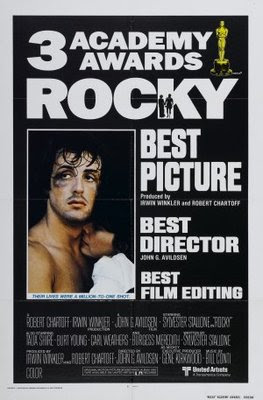At my gym, while putting in my time on the elliptical machine, I found myself watching a “Rocky” marathon. First there was the climax to Rocky V, featuring a brutal free-for-all in an alley, then ending with an inspirational moment on the steps of the Philadelphia Museum of Art between the man himself and his actual real-life son. (There were no supertitles on the gym screen, so I lacked any helpful dialogue. But with a movie like this one it’s impossible not to know what’s going on.)
Once Rocky 5 had come to its heart-tugging conclusion, the original Rocky started up, so I could watch a younger, chunkier Sylvester Stallone fight his way out of a meat locker and into a nation’s hearts. I’m not exactly a boxing fan, but in 1976 I was swept away by the experience of seeing Rocky in a packed theatre. (Remember when?) It’s one thing to experience a fight film while lounging on your couch; it’s quite another when hundreds of people are gathered in a darkened hall, all of them rooting for the same outcome. I’ll never forget the feeling of celebration when Rocky held his own, as though he had fought for US as well as himself.
I first met Stallone when he was an aspiring actor and I was Roger Corman’s “ace assistant” (in Corman parlance) at New World Pictures. He had come in that day in 1974 to interview for the role of a comic baddie, Machine Gun Joe Viterbo, in the original Death Race 2000. I first saw him, dressed all in black, looming out of the darkness of a seedy lunchroom to say hello to the film’s director, Steve Carver. Following his hilarious stint in Death Race, he acted again for Steve, playing Frank Nitti in Corman’s Ben Gazarra-starring Capone.
It says something about the Hollywood of that era that Rocky’s lady love also had a Roger Corman connection. Talia Shire had, back in 1970, played a major part in one of Roger’s last AIP films, the aggressively countercultural Gas-s-s-s- Or It Became Necessary to Destroy the World in Order to Save It. Along with such up-and-comers as Bud Cort, Ben Vereen, and the late Cindy Williams, she played one of a group of young hipsters fleeing from a poison gas intended to wipe out everyone over 25. In 1972 she had a much starrier role as Connie Corleone in The Godfather, for which she received an Oscar nomination. (It didn’t hurt that her brother Francis Ford Coppola was the director.) When Rocky came along, she was cast as the hero’s shy love interest, Adrian, which earned her a second Oscar nod, this time for Best Actress. Both films went on to have sequels, and so her career seemed assured.
But by the time I signed on as the story editor at Corman’s Concorde-New Horizon, Talia was clearly becoming tired of mediocre roles in forgettable films. In 1995 she was welcomed back by Roger with an opportunity to direct an erotic thriller called One Night Stand. She was pleasant to work with, but I barely recall the film: we made so many, and sometimes they all seemed alike. In any case, this was her one and only directing gig. But the memories returned as I watched her in a bittersweet low-budget film, 2008’s Dim Sum Funeral, in which she plays a deceased Chinese matriarch’s close friend and factotum. There are some tender moments and some funny ones, along with some exotic funerary rituals, and Shire does her best to look as though she’s giving it her all.


No comments:
Post a Comment